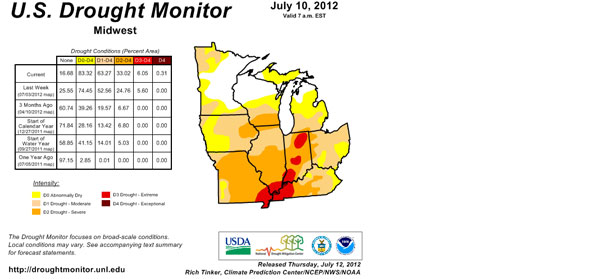

Jul 23, 2012Lack of rain latest worry for Midwest growers
With headlines dominated by early warmth and spring freezes, growers across parts of the Midwest have yet another concern: Precipitation – or the lack thereof.
As of late June, the National Drought Mitigation Center (NDMC) in Lincoln, Neb., has reported abnormally dry to moderate drought conditions across much of the Midwest.
“We have not gotten any significant amount of rain now for two months,” said Tom Kolasa, owner of K’s Acres in Hillsdale, Mich. “The frost affected us, and now the lack of water. Currently, we do not irrigate much. I think I will be looking for some way of doing that in the future.”
Kolasa grows vegetables, peaches, apples blueberries and raspberries. The lack of water is evident in the small size of this year’s berries, he said. The rest of his produce is pretty thirsty, too.
“I don’t think there will be any huge production from the vegetables, since the plants are stunted already,” he said.
Data from NDMC showed a lack of rainfall across much of Ohio and Indiana. Conditions were too dry in Illinois as well, said Chris Doll, an Extension educator with the University of Illinois.
“Naturally, talk continues about the weather,” Doll said in late June. “Now it is the lack of rain. Two weeks ago, southern Illinois growers reported a 10-inch deficit for 2012, and it has not changed any since then.”
In the southwest corner of Illinois, 0.7 inches of rain was measured during a four-week period from mid-May to mid-June. Non-irrigated plantings of small fruit crops appeared to need water, he said.
“This kind of weather slows uptake of calcium into fruit via the soil solution, so the addition of calcium supplements in cover sprays most likely is needed,” Doll said.” I’ve only seen that a couple of times during extended droughts.
“Small crops definitely needed supplemental water.”
What caused the drought?
A stalled frontal across the Gulf Coast and a series of Pacific storm systems produced unseasonably heavy rains in the Southeast and Northwest, while dry and warm weather in the Midwest accelerated drought conditions from Colorado to Indiana, according to NDMC.
Even with periods of heavy rainfall occurring sporadically in mid-June, widespread deterioration occurred due to the continued subnormal precipitation, higher temperatures and lack of water during the critical period when crops emerge. NDMC expanded its drought zone to cover all of Illinois, most of Indiana, southern Michigan and northern Ohio. By mid-June, only 25 to 50 percent of normal rainfall fell on the region, causing 2- to 6-inch deficits in the water needed by plants.
Wet in Minnesota
Minnesota growers recently made news for the opposite problem. They had too much rain, too fast. Over 8 inches of rain fell in a 24-hour period June 14. The flooding forced the Minnesota Department of Agriculture (MDA) to issue a statement against consuming any produce affected by floodwaters.
“Any edible produce that has been exposed to these waters should be considered adulterated and unfit for human consumption, said Heidi Kassenborg, Food Inspection Division director at MDA. “Farmers are ultimately responsible for the condition of the crops they market, and the top priority must be ensuring the integrity of the food supply.”
In June, Dayna Burtness, owner of the Laughing Loon Farm in Northfield, Minn., used her farm’s website to describe the devastation that a massive rain and hail storm wreaked on her vegetable crops.
Roughly one-third of Burtness’ farm washed away when it was hit with more than 8 inches of rain over several hours June 14. Lost were the majority of her peppers, half the eggplant and many beds of beans, beets, spring mix, spinach and more. The ensuing flood also destroyed many transplants, equipment and materials. Three days later, golf ball-sized hail severely damaged what was left of the crop, she wrote.
“I'm expecting a $20,000 to $30,000 loss in revenue, both from destroyed plants and lower yields from damaged plants,” Burtness said. “Farmer friends far and wide have been donating transplants, and I've received over 50 donations from friends of the farm, which will help us repurchase some of the thousands of dollars of materials and equipment that were damaged. It's a huge blow for a beginning farmer!”
By Derrek Sigler, Assistant Editor
none














